The new normal: looking for work and returning to work
The new normal: looking for work and returning to work
- The new normal
- Jobseeker requirements
- Workplace changes
- Protect yourself
- Remember the basics
- Know your rights
- Talk to an expert
- Coping with changes
- What will stay the same
The new normal
After nearly two years into the COVID-19 pandemic, Australia’s starting to emerge and life’s on the road back to normal.
Lockdowns have ended, restrictions have eased and instead of aiming for zero cases, we’re learning to live with COVID-19. Many businesses are reopening and job prospects are on the rise.
As we know, the world of work is different to how it was two years ago. We all have concerns that we didn’t have before. Will I get ill if I go to work? How can I protect the vulnerable people I spend time with? What should I ask my employer?
With any challenge comes opportunity and navigating a new way of life is no different. We recommend taking some time to make some time to think about strategies that can minimise risks, ease your worries and give you hope for the future.
Your jobseeker requirements may have resumed
It’s important to stay up-to-date with your mutual obligation requirements. These are the tasks and activities you agree to do while getting the JobSeeker payment from Centrelink. Mutual obligation requirements were suspended in some areas due to COVID-19 but have now resumed in all states and territories.
You can continue to view and update your mutual obligations through your JobSearch account and the jobseeker app, which you can download from the apple app store or google play store.
Workplace changes
If you’re returning to work or starting a new job, things might look and feel different. Go gently and tune in to how these changes make you feel. Reach out to someone you trust if you need to talk.
If you’ve got an office job, you’ll likely have some flexibility with how you work. You may work from home some of the time, have virtual teams and more flexible hours. If you’re working remotely, be aware of your work/life boundaries. While the commute from your bedroom to your home office is significantly less, it can be harder to switch off. Try to stick to a routine, take regular breaks and incorporate some physical activity into your day.
If you’re returning to a physical workplace, you may notice some changes too. Workstations may be more spaced out, safety signage and hand sanitiser will likely be everywhere and less people may be able to be there at the same time. Some people will be excited to return, others will be more apprehensive.
If you’re working in retail or hospitality, you’ll may have to wear a mask and continue to practise social distancing. Hair and beauty services will also have new rules and restrictions.
Depending on your state and territory COVID-19 requirements, you may need to be vaccinated to do certain jobs.
Stay up to date with your state and territory restrictions and requirements.
You can read more on navigating your return to work in the section below titled Know your rights.
Protect yourself
“The pandemic will become a pandemic of the unvaccinated,” Tim Soutphommasane, Director of Cultural Strategy at the University of Sydney said at a recent event discussing what living with COVID will look like.
The best way to arm yourself against COVID-19 is to get vaccinated if you can. Being vaccinated will also protect your loved ones and community by slowing the spread of the virus.
Vaccinations are now widely available, so chat to your doctor to find out more and book one. There are also many walk-in clinics and pharmacies offering the vaccines. You need 2 doses of the vaccine to be fully protected. You don’t have to get your second dose at the same place you got your first one.
There are dedicated vaccination hubs available for people with disability, their families, carers and the disability workforce. These hubs can help you get vaccinated in the fastest way possible specific to your circumstance.
If you want more help or support, including to arrange an appointment, you can call the Disability Gateway Helpline on 1800 643 787 – available Monday to Friday, 8 am to 8 pm (AEDT).
For information about COVID-19 vaccines, including finding and booking a vaccination, visit https://www.health.gov.au/initiatives-and-programs/covid-19-vaccines.
Remember the basics
Some people may be unable to get vaccinated due to medical reasons. These people need extra protection. This is why it’s important for those who can, to get vaccinated, and for everyone to practise the basic health advice.
On top of vaccination, there are important steps we should all take to help minimise the risks and spread of COVID-19 at home, in public and at work:
- Practise good hygiene including washing your hands, covering your coughs and cleaning your home or workplace.
- Wearing a mask significantly reduces the chance of transmission. Depending on your state’s current rules and restrictions, you may be required to wear a mask at work, in public indoor places or even outdoors. Follow the links on this page to find your local government’s latest advice.
- Physical distancing can slow the spread. As states and territories ease restrictions, it’s important everyone continues to stay 1.5 metres away from others where possible.
- Public gatherings and social occasions significantly increase the risk of COVID-19 spreading. Think about how you can minimise your exposure to others.
- Testing and isolation if you’ve got any symptoms, however mild, you must get tested and stay at home until you either have a negative test result or your symptoms have gone – whichever is longer. It may take a couple of days for your test results to come back.
- Care for your health and do what you can to stay well. Get medical advice if you’re unwell, no matter what the medical problem.
Know your rights
Your rights as a CoAct customer
Our priority is keeping jobseekers and our staff safe. Our sites follow their local health advice and state and territory COVID-19 requirements. All sites have a COVID-safe plan. We encourage jobseekers and staff to get vaccinated where they can.
As the situation is changing daily regarding vaccinations and state restrictions, it’s very difficult to give you up-to-date advice on how we service you. We recommend you review the health advice in your state. Find a link to your state or territory’s health advice here.
If you’d like to speak to someone, call the national employment services customer service line on 1800 805 260 or your local employment services office. You can find the contact details for all of the CoAct employment services offices here.
Read our vaccination and receiving employment services blog for more.
Your rights as an employee
Employers are legally responsible for keeping their employees safe. At a minimum, they should be complying with your state’s health and safety advice. This includes encouraging vaccination, maintaining physical distancing, appropriate cleaning and hygiene practices and carrying out risk assessments.
You have the right to ask your employer about safety protocols and provide feedback or raise health and safety concerns. Read more on protecting employees and customers here.
Find out more about workplace health and safety advice here.
Get more information on going to work during coronavirus here.
Do I have to be vaccinated to go to work?
The Australian Government’s policy is that COVID-19 vaccinations are voluntary for most Australians, although its hopes that as many as possible choose to be vaccinated.
Some states and territories have also issued public health orders mandating vaccination for certain industries or workers. Information about relevant public health orders can be found on the Safe Work Australia website.
Employers can only require their employees to be vaccinated where:
- a specific law (such as a state or territory public health order) requires an employee to be vaccinated
- the requirement is permitted by an enterprise agreement, other registered agreement or employment contract, or
- it would be lawful and reasonable for an employer to give their employees a direction to be vaccinated, which is assessed on a case-by-case basis.
Read more about COVID-19 vaccinations and federal discrimination law.
Talk to an expert
Take the time to make the right decisions for you. Think about what you’re comfortable with – both in work life and home life. Remember it’s okay to be unsure or worried.
Talk to your doctor to find out if vaccination is right for you. Don’t take advice on this from anyone that’s not a qualified health professional. If you’ve decided to go back to work or if you’re looking for work and have an idea of what kind of job you want, check with your doctor and make sure it’s a safe environment based on your health, as well as assessing the location.
People you can talk to include:
- your doctor
- a mental health practitioner such as a counsellor, psychologist or psychiatrist (your doctor can refer you)
- trusted friends or family
- employment services – we can help you navigate your job search and potential jobs and employers based on your health concerns
- Beyond Blue Coronavirus Mental Wellbeing Support Service. This service provides information, advice and strategies to help you manage your wellbeing and mental health during the COVID-19 pandemic. Call the hotline on 1800 512 348 or visit the Beyond Blue Coronavirus Mental Wellbeing Support Service.
Coping with changes
Keeping up to date with restrictions, staying on top of your mutual obligations and thinking about what kind of workplace is right for you can be exhausting. Remember that if things are getting too much, it’s okay to take a break. Get outside and moving, eat well, drink plenty of water and reach out for help if you need.
What will stay the same
We’re still here to help with your job search, tailoring your job plan to your needs, skills and interests, connecting you with the right employers and sticking around to support you and your employer once you’re in work.
Read our blog post on vaccination and receiving employment services for more information on how we’re servicing our customers.
Online job applications and your recruitment approach
Applying for jobs online will continue to be the main way to respond to job vacancies. Following best practice for job applications will stay the same too. This includes tailoring your resume and cover letter to each job application, updating your LinkedIn profile, researching the employer and following up after you’ve applied.
What may look different is the interview process. Depending on the employer and your local health advice and state and territory COVID-19 requirements, you may have job interviews over the phone, video or even a pre-recorded video, instead of face-to-face. We can help you navigate this when the time comes.
Industry cycles and seasonal and in-demand roles
The way some industries work may have changed, but seasonal cycles, for the most part, have not.
Agriculture and the Harvest Trail still follow the usual schedule, and there are even more job opportunities for local workers while our borders are still compromised. Mangoes still need to be picked October to February, winter is still prime citrus season and the sugar cane harvest will always be the second half of the year.
While international tourism may take a little longer to go back to its pre-COVID state, domestic tourism will be in strong demand and has already started to pick up. The usual travel periods such as over the dry season and school holidays will remain the same, so it will be easier to predict job demand moving forward.
The summer period is always a key time for jobs in retail and hospitality. With vaccination levels rising and restrictions lifting, now’s a great time to consider a role in these industries.
We can use what we’ve learnt over the past 18 months to continue to protect ourselves and our communities. We can also adapt to what the new world of work looks like and think about what we want our lives to look like. Living with COVID offers new opportunities to put the health of ourselves and those we care about first, as well as ask for what we need to feel safe.
Register for job search support that works for you. Give us a call on 1800 226 228 or register online.
Post categories
- Employers (20)
- Job seeker tips (172)
- News (56)
- Real stories (144)
- Referral partners (1)







